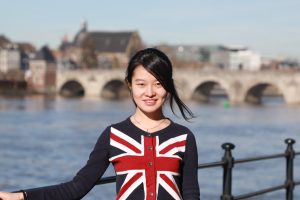 I was born and grew up in Northeastern China. I majored in Chemical Engineering and Technology during my bachelor in Dalian University of Technology, Liaoning, China, and got solid training in chemistry-related subjects, with a focus on Fine Chemical Manufacturing, in State Key Laboratory of Fine Chemicals. Among many research topics there, I got particularly interested in biology-related studies e.g. protein probes, which is the reason why I applied to and started a master program “Molecular Techniques in Life Science”. My master program is a unique combination among Karolinska Institutet, KTH Royal Institute of Technology and Stockholm University in Stockholm, Sweden, which enlightened me with state-of-art views in biotechnology and covered a wide spectrum of subjects in theoretical molecular technologies, focusing on bioinformatics and multiple “omics” studies. I did my master thesis project in the field of computational biophysics, on the topic of molecular docking & molecular simulation on one ion channel in nervous system and the small-molecule drugs interacting with it.
I was born and grew up in Northeastern China. I majored in Chemical Engineering and Technology during my bachelor in Dalian University of Technology, Liaoning, China, and got solid training in chemistry-related subjects, with a focus on Fine Chemical Manufacturing, in State Key Laboratory of Fine Chemicals. Among many research topics there, I got particularly interested in biology-related studies e.g. protein probes, which is the reason why I applied to and started a master program “Molecular Techniques in Life Science”. My master program is a unique combination among Karolinska Institutet, KTH Royal Institute of Technology and Stockholm University in Stockholm, Sweden, which enlightened me with state-of-art views in biotechnology and covered a wide spectrum of subjects in theoretical molecular technologies, focusing on bioinformatics and multiple “omics” studies. I did my master thesis project in the field of computational biophysics, on the topic of molecular docking & molecular simulation on one ion channel in nervous system and the small-molecule drugs interacting with it.
Motivated by the life in Sweden, I would like to continue a research career in Europe and stay in the frontier in life science field. The Marie-Curie Training Network provides a wonderful opportunity for this and also the chance to experience various labs in different countries. In the TAPAS project, I will be studying the interaction of platelet collagen/fibrin receptor GPVI with local lipids and membrane microdomains. Apart from a range of basic molecular biology techniques, I will also utilise an emerging technology using styrene maleic acid copolymers as ‘molecular pastry cutters’ to convert the plasma membrane into nanodiscs, termed SMA lipid particles (SMALPs). The affinity-purified GPVI-containing SMALPs will be analysed for lipid and protein content using mass spectrometry-based lipidomic and proteomic methods. I will spend year 1 & 2 in University of Birmingham, UK and year 3 in University of Santiago de Compostela, Spain. I will also spend 6 months in ISAS, Germany during year 2.
I have been appealed to the studies of proteins—macromolecules which are produced within organisms by nature and are linked directly to biological function and disease. Moreover, their comprehensive 3D structures and variation under different conditions make them fantastic subjects for physics/chemistry/structural studies. I’m keen to explore deeply into a few selected proteins and solve their enigma, while combining my knowledge in different fields. The TAPAS project will serve as a great chance for me to connect with molecular biology experimentalists and learn essential & novel experiment techniques for my future career.
